Quirky corn, peculiar peas and our food security
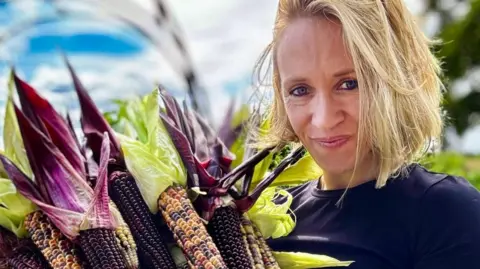 She Grows Veg
She Grows VegThey may not be flowers, but with their plump, juicy fruits and vibrant colours, these vegetables certainly do not look out of place at this year's RHS Chelsea Flower Show. The exhibit, on display in the Great Pavilion and titled Grow the Rainbow, has been created by Lucy Hutchings and Kate Cotterill who run a seed company in Suffolk. The pair specialise in heirloom seeds which they say are vital to food security in the face of climate change.
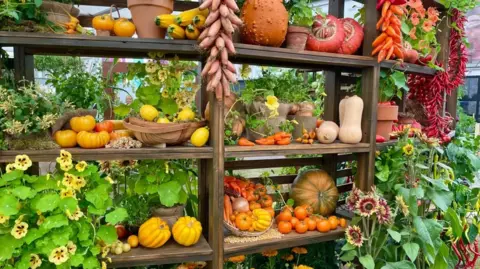
Based in Capel St Mary near Ipswich, the women sell their heirloom seeds - weird and wonderful vegetable varieties, each dating back more than 50 years and not genetically modified.
The pair won gold when they made their debut at the prestigious west London flower show last year.
But there is more to their business than the picture-perfect produce that has attracted nearly 250,000 social media followers. Lucy and Kate are passionate about biodiversity.
In the face of climate change and as ever-evolving diseases and pests threaten crops worldwide, Lucy explains that heirloom seeds can "adapt to their specific growing environment".
Unlike hybrid seeds, which much of our supermarket produce comes from, heirloom vegetables grow year-on-year from seeds saved from healthy plants - that are constantly evolving.
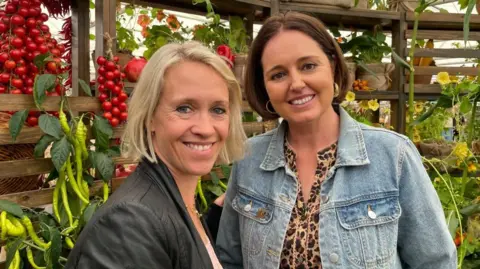
"You are giving yourself a fantastically well adapted plant, specific to your growing environment," Lucy says.
"This is so important on a global scale because if we are 100% reliant on hybrid seed for all our food... it would only take one terrible season, one disastrous climate event and an entire crop can be wiped out.
"If we are growing more and more open-pollinated (heirloom) varieties... we can be saving seed, giving us a source of seed which future proofs us against these big climate changes."
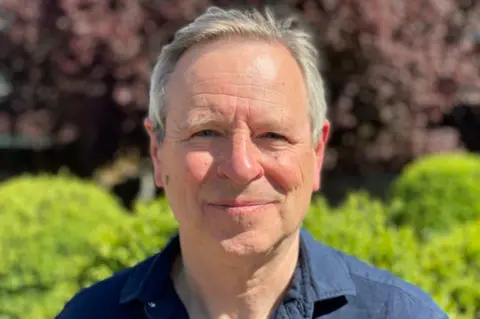
Prof David Barling, from the Centre for Agriculture at the University of Hertfordshire, agrees.
He says biodiversity in our seed varieties is crucial as we face severe droughts, increased flooding, and more diseases.
"The wider variety we've got... the more likely we are to find variety which are resilient to or have already adapted to these harsh conditions."
He added that by involving ordinary people in growing their own heirloom vegetables, people were much more engaged "not just as consumers but actively involved in sustaining our food system and thinking about the sustainable way forward".
Just last year a report by the University of Oxford for the Food Standards Agency said climate change was having "wide-ranging impacts" on our food system.
A spokesperson for the Department for Environment, Food and Rural Affairs (Defra) told the BBC: "We are supporting innovative work such as precision breeding which offers huge potential to boost food security and transform the plant breeding sector in England."
They also said Defra was "investing up to £15m in genetics innovation" in crops.
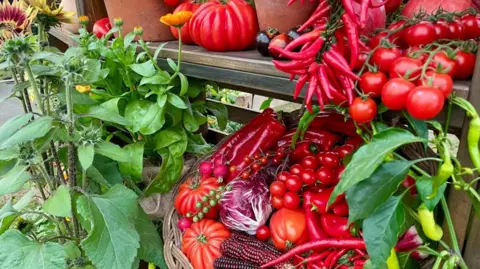
Back in the pavilion, Lucy and Kate are hoping they can first have an influence on people at a local level.
"If people start growing their own, they introduce themselves to seasonality," says Kate.
"They know that they can only get strawberries in this country at one time of the year, and they know the love and the labour that goes into ripening a tomato."
"Hopefully people become more considered so when they're going to the shop... that understanding of seasonality means less waste, higher nutrients and hopefully zero miles if you're growing it yourself or a lower [food] miles harvest.
"Small changes in habit make a big impact in the world."
Follow Suffolk news on BBC Sounds, Facebook, Instagram and X.
